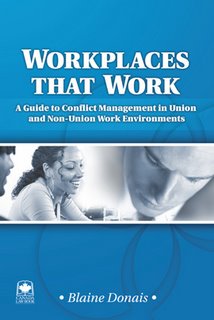My study of workplace fairness began may years ago in law school when I was asked to prepare a paper to submit to the Saskatchewan Government Labour Law Reform Committee. In this paper I advanced the idea that there should be legally entrenched standards for "due process" in the workplace. These standards, I argued, had to exist regardless of whether or not there was a union in the workplace.

For many years after this I studied workplace fairness from the vantage point of a practitioner in workplace conflict management in the energy sector in Ontario. Taking the experience I gained and applying it to earlier hypotheses, I began research on the idea of a "right" to workplace fairness. This culminated in a conference paper called "The Social Right to Workplace Fairness" that I presented to both Osgoode Hall Law School and the Carleton Conference on Conflict Resolution in 2000.
From there as the years went by, my ideas concerning "fairness" and "conflict management" began to merge into a theory that conflict management systems could be measureed for fairness excellence and that such excellence could be achieved in any system. I developed a diagnostic tool that measured fairness in conflict management systems.
Workplace Fairness is defined as the harmony of Justice, Efficiency, Engagement and Resource Sufficiency in Workplace Conflict Management Systems. Each of these four Fairness Quotients: Justice, Efficiency, Engagement, and Resources consist of a number of elements or focuses as listed in the table below. These are the constituent parts of workplace fairness.
I have come to the conclusion that Workplace Fairness is a commodity most sought after by employees, managers and employers. Where a workplace meets the standards of fairness listed above, it will be healthier, happier and more productive.
But this is only part of the reason why we should care about workplace fairness. Underlying the quest for harmony and increased productivity is really a philosophy about how we choose to live our lives. As human beings most of us spend nearly half of our waking adult lives in the workplace. Our work defines us to a great extent.
We are social beings that are partly the product of our own socialization. Workplace structures that are essentially unfair lead to a general sense of unfairness in the workplace. By accepting unfairness in the workplace we condition ourselves and our society to accept unfairness in other aspects of our lives and the lives of others on the planet we share. This may account in some part for our acceptance of unfairness in the world around us.
Therefore, there is a greater need to seek fairness in every aspect of our lives.
It is for this reason, that I believe we must care about workplace fairness.
3 comments:
Blaine,
Not only do you target an admirable goal, but you suggest achieving it in a systematic fashion.
For the benefit of your readers, could you tell us at least one short workplace story where the presence or absence of procedural fairness guarantees improved or weakened the productivity of the company as a whole?
Best of luck with the book. I can't wait to get my hands on a copy. I'll be teaching Selected Issues in Employment Mediation at the Straus Institute this Spring and am looking forward to launching some of your suggestions in the classroom.
Best,
Vickie
Thank you Vickie. It is an honour to have a comment from such a highly regarded mediator.
There is a certain workplace, that shall remain nameless, that I am quite familiar with, that ostensibly uses the greivance procedure along with managerial decision-making as its primary conflict management system. On a review of the system it has become clear that workplace regulation options and communication options have not been well utilized. As a result there is confusion about roles and responsiblities in the workplace. This has lead to significant levels of conflict as workplace participants feel that their work is being interfered with. This in turn has lead to bitter conflict and acrimony between large groups of people in this workplace. The conflict manifests itself in reduced productivity as the workplace participants spend valuable time and energy in factionalized conspiratorial discourse. In this particular case it may be a precipitating factor in job actions - perhaps even a strike or lock out. The stakes are high. The furture of the organization may lie in the balance.
At this point even recommendations of third party neutral interventions are met with suspicion on all sides. When the workplace reaches this point, it is on the brink of disaster.
Using the diagnostic tool I have developed, I have determined that while the system scores relatively high on the justice quotient, it scores very low on the efficiency, engagement and resource sufficiency quotients. To improve this workplace - indeed to bring it back from the point of self-destruction - will require measures aimed at dealing with efficiency, engagement and resources. Any proposed improvements will be met with suspicion. So there is a very difficult path ahead for this particular workplace.
I shall post again about some workplaces I have reviewed that work well.
Cheers
Blaine
This is true since this is pertinent to the interest of increasing workplace efficiency. Efficiency, after all, has several dimensions: social, emotional, as well as physical, all of which contribute to the end goal of steadily improved production. The latter of course can only be achieved, by harmonizing all elements that are involved. A huge part of which are the employees themselves: their back and forth, their general well-being, and whether they are properly incentivized for the next work cycle.
Barton @ ISA
Post a Comment